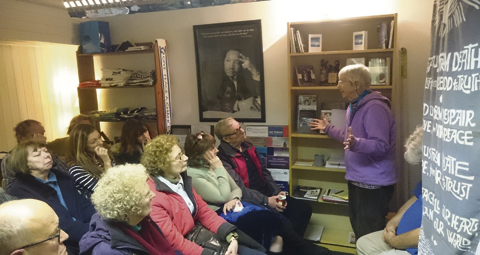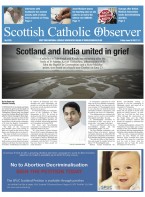BY Daniel Harkins | January 22 | ![]() 0 COMMENTS
0 COMMENTS ![]() print
print

Praying peace will prevail through protest
DANIEL HARKINS speaks with SR MEGAN RICE about her lifelong commitment to non-violent protest against nuclear weapons
One early Saturday morning in July 2012, a guard at one of the world’s largest nuclear weapons facilities pulled up to a group of intruders who had breached security. Interrupting their hymn singing, the intruders, two elderly men and a religious sister, told the guard that they had been sent by God.
Some 42 months later, having finished up a two year prison stint for her part in the anti-nuclear weapons protest, 85-year-old Sr Megan Rice came to a small building just off Edinburgh’s Royal Mile, in the shadow of St Columba’s Free Church, to tell her incredible story (above right top) to around 30 people at the Edinburgh Peace and Justice Centre.
Before her talk, Sr Megan spoke to the SCO about a life rooted in the activism of the Catholic Worker movement, and her non-violent protests that have seen her imprisoned throughout the US.
Born in New York in 1930, Sr Megan said her earliest memory was being visited in her family home by Dorothy Day, the American convert who founded the Catholic Worker movement and newspaper. Dorothy Day’s work was singled out for praise by Pope Francis in his speech at the US Congress in September.
“My father knew her and she came to our house when I was three-years-old,” Sr Megan said. “There was never a time when the Catholic Worker was not in my house. She used the social Gospel for what it is meant to be.”
Mission
Sr Megan joined the Society of the Holy Child Jesus aged 18 and began her mission in Africa—following in the footsteps of her committed Catholic parents who worked on the continent—teaching in schools in Nigeria and Ghana.
Most of her life though has been devoted to campaigning against nuclear weapons, a life shaped by the horrors of the Hiroshima and Nagasaki nuclear bombings during the Second World War. One of Sr Megan’s uncles had served in Nagasaki shortly after the dropping of the atomic bomb on the city, and had accompanied the city’s archbishop around in the grisly aftermath,
witnessing the bombed out cathedral, destroyed whilst parishioners were inside celebrating Mass.
“I was a depression baby born in the poverty in New York so I was consciencetised about social needs, whether that was racism or the nuclear bomb,” she said. “It took us a long time for us to realise the evil [of nuclear weapons] because in 1945 it was like ‘Wow, we don’t have to invade Japan.’”
The secrecy of the nuclear project, Sr Megan said, was an early indicator that something wasn’t quite right. It extended, she said, to a neighbour during her childhood who worked on the Manhattan Project, the research project that lead to the development of the first A-bombs.
“There was this notion that there must be something wrong going on because it was so secret,” she said. “And we knew of that secrecy in this family—this husband couldn’t tell his wife what he was doing. How could you not tell your wife what you were doing every day?”
Activism
Anti-nuclear weapons activism often has a faith-based tint to it. The Glasgow Catholic Worker Group, with whom Sr Megan prayed with during her visit regularly hold vigils at the Faslane Naval Base, where the UK’s Trident nuclear weapons system is housed.
One of the world’s most active anti-nuclear weapons groups, the Ploughshares—and its UK version the Trident Ploughshares—takes its name from the Book of Isaiah. In the US, there is a long, often-controversial, tradition of priests and sisters getting arrested for trespassing on army bases and nuclear sites. As one activist said at Sr Megan’s talk, it is often those with faith who have the resolve to go to prison for their beliefs.
Sr Megan began protesting in the 1980s at Nevada test sites, and was arrested numerous times over the following decades for civil disobedience. It was witnessing the trial of some of her fellow activists that put her on the journey to her own two-year imprisonment.
“There is nothing like a course on non-violent civil resistance and the necessity for it than attending a trial where you see the blatant denial of truth on the side of the prosecutors, and the judges who go along with the prosecutors,” she said. “And the jurors—who are from the culture of the place that is being enriched by the profit of nuclear production.”
In 2012, Sr Megan, with fellow Christian activists Michael Walli and Gregory Boertje-Obed, broke through the outer security of the Y-12 National Security Complex in Tennessee, which fabricates and stores weapons-grade uranium. They travelled through a wooded hill and cut through fences to reach the white-walled uranium storage facility. There they put up banners, spray-painted slogans on the building, and symbolically daubed the walls with blood, before singing hymns for 30 minutes as they awaited the arrival of security.
The break-in raised questions about lax security at nuclear facilities, and Sr Megan made headlines around the world. They were charged under the 1918 Sabotage Act, with Sr Megan given 35 months in jail and her two co-defendants 62 months each. She was last year released from a Brooklyn prison after an appellate court overturned her conviction and she was re-sentenced to time served.
The Church has long-opposed nuclear weapons, but many view such extreme action with disdain. Sr Megan though sees it as a necessary responsibility.
“It’s not something to be done lightly,” she said. “We know the necessity of this—we learned in the Nuremberg Trials that we, as human beings, are guilty if we do not expose known crimes. We are all so convinced of the criminality of this and we have an obligation to oppose that, so direct action is necessary; as well as legal action and education action and other ways to oppose.
“Secrecy and denial has cloaked the majority of people in the US who are not aware of this history. War is an unending source of income in a way. People are falling into the fallacy that this is needed for security but it is only needed to keep up the military-industrial complex.”
Hope for the future?
Sr Megan looks at the political leaders in the US with scepticism. Barack Obama is impotent to change things, while the current presidential candidates, Donald Trump in particular, she fears, are simply front men, though she has some kind words for Democratic candidate Bernie Sanders and the Green Party’s Jill Stein. Her hope comes from the younger generation of activists picking up the baton.
“I’m optimistic,” she said. “That’s our hope. There is an awakening going on. I have great hope for the future.”
Before she left Scotland, she accompanied the Glasgow Catholic Worker group to Faslane Naval Base, on the west coast. There they said a prayer for peace and nuclear disarmament: “Come let us go up to the mountain of the Lord, that we may walk the paths of the Most High. And we shall beat our swords into ploughshares and our spears into pruning hooks. Nation shall not lift up sword against nation—neither shall they learn war any more. And none shall be afraid, for the mouth of the Lord of Hosts has spoken.”











